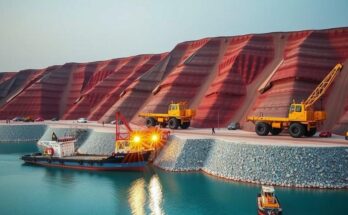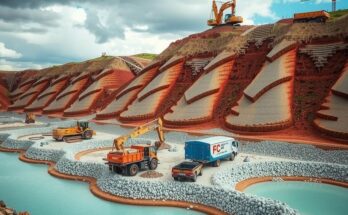Minister Dele Alake has urged for enhanced trade between Nigeria and the UAE, primarily focusing on solid minerals. He emphasized the need to address illegal mineral trade and proposed strategies for collaboration. UAE Ambassador Salem Al Shamsi confirmed commitment to strengthening ties, announcing an upcoming Nigeria-UAE economic forum aimed at boosting foreign investments. A technical committee will be established to explore these collaborative opportunities.
In a progressive move to bolster trade relations between Nigeria and the United Arab Emirates (UAE), Minister of Solid Minerals Development, Dele Alake, has advocated for enhanced cooperation, particularly in the solid minerals sector. While hosting UAE Ambassador to Nigeria, Salem Shaeed Al Shamsi, Minister Alake highlighted the rich historical ties spanning over five decades between the two nations, urging the need to deepen these connections through expanded mining trade. Minister Alake pointed out significant opportunities within the mining sector, noting, “In the mining sector, we see considerable opportunities for collaboration. While there is considerable trade in gold, much of it remains illegal, with a large portion of Nigerian gold ending up in the UAE unlawfully. We propose working together to develop strategies to curb illegal gold trade and establish a regulatory framework that legitimizes this trade, allowing both countries to maximize their benefits.” This initiative aims to establish a legitimate marketplace for mineral trade and diminish illegal operations that undermine the economy. Furthermore, the Minister underscored Nigeria’s abundant reserves of globally sought-after minerals, suggesting that the UAE’s role as a significant mineral trading hub could greatly benefit from a fortified partnership. Alongside this, Alake expressed a keen interest in enhancing technology transfer between the two nations to further advance Nigeria’s mining capabilities. In response, Ambassador Al Shamsi reaffirmed the UAE’s commitment to strengthening its long-standing relationship with Nigeria. He referenced recent developments such as the resolution of visa application restrictions and the establishment of a Memorandum of Understanding (MOU) between UAE businesses and Nigeria’s Solid Minerals Development Fund (SMDF). Ambassador Al Shamsi noted, “The lifting of visa application restrictions and the launch of a new visa application website demonstrate my country’s dedication to advancing bilateral relations.” The Ambassador further announced an upcoming Nigeria-UAE economic forum, which is set to take place in Nigeria, comprising participation from 30 to 35 major Middle Eastern and UAE companies. This forum aims at enhancing foreign direct investment (FDI) inflow into Nigeria. To jointly tackle the challenge of illegal mineral trade and promote legitimate commerce, both parties agreed to form a technical committee tasked with exploring collaboration strategies in this regard.
The significance of enhancing trade in solid minerals between Nigeria and the UAE is rooted in their historical connection, which spans over 50 years. Nigeria is rich in various solid minerals, making it a valuable partner for the UAE, a prominent global hub for mineral trade. The illegal trade of gold and other minerals has been a significant issue, necessitating collaborative measures to establish a regulated and equitable trading environment. This engagement is expected to open doors for increased foreign direct investment and technological advancement in Nigeria’s mining sector, benefiting both nations economically.
In conclusion, the discussions between Minister Dele Alake and UAE Ambassador Salem Shaeed Al Shamsi represent a positive stride towards solidifying trade relations focused on the mining sector. By addressing the challenges posed by illegal mineral trade and proposing collaborative solutions, both nations could enhance their economic partnerships. Initiatives such as the anticipated economic forum and the establishment of a technical committee signal a commitment to maximize the benefits of their mineral resources, ultimately fostering growth and development.
Original Source: tribuneonlineng.com




